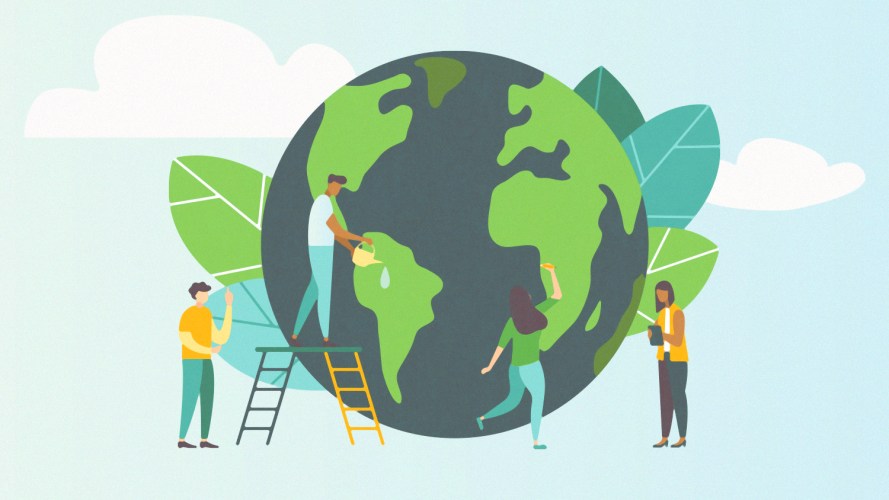Ecopreneurs Are Leading a New Age of Net Zero Businesses



Being a business and operating with purpose are not mutually exclusive. Two ecopreneurs tell how it’s done.
Diego Saez-Gil grew up in Argentina, on the outskirts of what he described as a beautiful jungle. Today he’s on a mission to restore the natural ecosystems in South America and other places where they have been similarly lost to deforestation. He’s part of a growing generation of “ecopreneurs,” entrepreneurs that merge business ideas and positive social impact. Here are two of their stories.
Saez-Gil is CEO of Pachama, a tech company that uses satellite imagery and artificial intelligence (AI) to measure and monitor the sequestration (removal) of carbon from the atmosphere. The company’s technology also connects companies with global restoration and conservation projects that align with their carbon reduction goals.
Catarina Schwab, co-founder and co-CEO of NPX Advisors, is on a mission to transform how nonprofits are funded. Rather than throw money at a problem and hope for a solution, NPX’s donor fund explicitly ties investing and donating to measurable results and impact.
These ecopreneurs identified deficiencies in the sustainability market, and applied an entrepreneur’s mindset to capitalize on those opportunities while serving a larger purpose.
Tips from ecopreneurs
- Start with the end goal in mind. Ask yourself what impact you’re trying to achieve. Is it climate change? Homelessness? Economic mobility? Tree survival? “Nonprofits have been trained to sell problems and activities, but not the impact,” said Schwab. “When impact is your North Star, you will do things and fund things differently.”
- Believe that you can be a business while also solving the world’s problems. “Those two things are not divorced,” said Saez-Gil. “The biggest companies will be those that solve and address climate change. We can apply the same technology and tools that businesses use to solve problems to climate.”
- Act with integrity. That way, when you make mistakes, you can acknowledge them, fix them and move fast.
- Build or join a like-minded community to learn from others. Unlike entrepreneurs, ecopreneurs tend to focus on collaboration and cooperation to achieve their goals.
- Persist. Being an ecopreneur means waking up each day — even those days when you want to stay in bed — and being passionate about what you’re doing. Remember that it’s not about you the individual, it’s about humanity.
“Billions of dollars are spent on climate [initiatives] but very little is tied to impact,” Schwab said during a session at Dreamforce. “NPX transforms how nonprofits are funded by linking every dollar of capital with impact.”
Donations from its fund are released only if predetermined impact measures are achieved and verified, instead of upfront. For example, a nonprofit workforce development program it supports, Last Mile, which teaches incarcerated people how to code, would not receive funds unless it hits inmate hours worked goals.
Schwab said this approach is more transparent, changes behavior, and drives more impact.
“Donors can see where the money goes, and trust that it’s going to the right place,” she said.
The firm has raised millions to fund nonprofits addressing issues including climate, economic mobility, education, poverty, and homelessness.
Saez-Gil’s mission is forest restoration and conservation. His company tracks the greening of forests, including measuring the amount of carbon captured. Its marketplace sells carbon credits to offset emissions, with technology that monitors and verifies progress. Tracking these variables instills trust that the credits a company purchases are actually reducing carbon.
“Trees are a very scalable way to sequester carbon from the atmosphere,” he said.
While tree cover is falling globally — 388 million hectares lost between 2001 and 2018 — trees serve as nature’s sponge, soaking up carbon as they grow.
Pachama’s technology also allows companies to connect with and support reforestation projects around the world. The impact is measurable — they’ve already protected 1.5 million hectares of forest in 10 countries.
Of course, no one succeeds in a vacuum. Both ecopreneurs leveraged UpLink, an open-source platform to foster mass participation from entrepreneurs, community groups, and others to meet the United Nations Sustainable Development Goals. It was co-designed by the World Economic Forum, Deloitte, and Salesforce, with the goal of enabling next-generation mission-driven innovators like Schwab and Saez-Gil.
“When you’re starting a project, you need connections to investors, employees, customers, and mentors,” said Saez-Gil. “UpLink connected us to an entire community of those, plus a peer network of innovators bringing ideas to market, like 1T.org.”
“UpLink allows [companies] to scale their sustainability efforts,” said Schwab.
Create a net zero future
Understand the impact of climate change, the current global policy landscape, and how to become a climate champion.





























